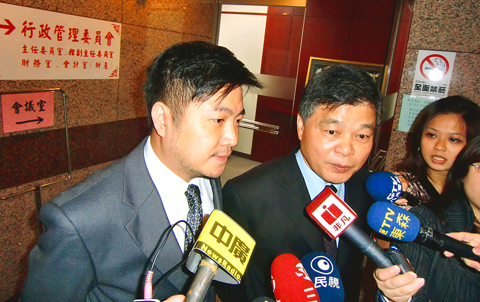The Chinese Nationalist Party’s (KMT) recent decision to hire a human resource expert shows Secretary-General King Pu-tsung’s (金溥聰) determination to reform the century-old party, despite a mixed response to the decision, political observers said.
Ryan Wu (吳睿穎), former executive vice president of online 1111 job bank, was hired by King to help plan KMT human resource initiatives. Wu will work as a personnel project manager in the party’s Administration Committee on a one-year contract.
“This is a move that aims to bring a breath of fresh air into the KMT’s rigid system and transform its image into that of a ‘youth friendly’ party,” said Liao Da-chi (廖達琪), a political scientist at National Sun Yat-sen University.

PHOTO: CNA
King’s first major hire since he assumed office in December drew attention because of the timing and Wu’s controversial past. King, however, brushed off the criticism and said he hired Wu for his expertise.
The appointment came in the wake of King’s pledge to reform the KMT within three years and turn the party into an election machine. Since last year, the KMT has suffered three straight setbacks in two by-elections and a mayoral election, and many of the party’s employees have said they fear losing their jobs.
Post-election analysis suggested that the KMT needs more young talent at the local level to boost its appeal to young people.
Wu, 43, worked as a media relations chief at Taipei City’s Department of Labor in 2001 when King was deputy mayor. He stirred controversy last month when he said on a TV show that he had an extramarital affair with actress Ada Pan (潘慧如), which she denied.
His appointment to the KMT post came as a surprise as he had few ties to the KMT and is seen as an “outsider.”
Several KMT legislators have spoken out against the appointment, including KMT Legislator Lu Hsueh-Chang (呂學樟), who said that while it’s a good thing to bring in “corporate management,” Wu is unfamiliar with the way party affairs are run, which could be dangerous.
Other KMT legislators have claimed that they do not know Wu.
“It seems to me King is trying to use outside resources to carry out his reform, working his way in from the outside rather than taking the ‘inside-out approach,’” said Hsu Yung-ming (徐永明), a political scientist at Soochow University.
Wu’s appointment could be a “turning point” for the KMT, which has little or no appeal for young people because of all its old politicians, Liao said.
“In addition to having a human resource background, Wu is media-savvy and outgoing. That can be a plus for the party. Also, he has been hired on a one-year contract so if he does not deliver, he can be let go. The KMT has nothing to lose,” Liao said.
For a party with 106 years of history, full-scale reform will be difficult, Liao said. That is why King is giving priority to party image and communication before restructuring, she said.
King’s main options now are to create a new image for the party and build a human resource pool so that the young generation can step in when the current generation fades away, Liao said.
“I also think it would be better if King avoided any action that involved local party factions, as it is one of the most complicated factors related to party reform,” she said.

Taiwan is to have nine extended holidays next year, led by a nine-day Lunar New Year break, the Cabinet announced yesterday. The nine-day Lunar New Year holiday next year matches the length of this year’s holiday, which featured six extended holidays. The increase in extended holidays is due to the Act on the Implementation of Commemorative and Festival Holidays (紀念日及節日實施條例), which was passed early last month with support from the opposition Chinese Nationalist Party (KMT) and Taiwan People’s Party. Under the new act, the day before Lunar New Year’s Eve is also a national holiday, and Labor Day would no longer be limited

Taiwan is to extend its visa-waiver program for Philippine passport holders for another year, starting on Aug. 1, Minister of Foreign Affairs Lin Chia-lung (林佳龍) said on Friday. Lin made the announcement during a reception in Taipei marking the 127th anniversary of Philippine independence and the 50th anniversary of the establishment of the Manila Economic and Cultural Office (MECO) in Taiwan, the Ministry of Foreign Affairs said. The decision reflected Taiwan’s commitment to deepening exchanges with the Philippines, the statement cited Lin as saying, adding that it was a key partner under the New Southbound Policy launched in 2016. Lin also expressed hope

Costa Rica sent a group of intelligence officials to Taiwan for a short-term training program, the first time the Central American country has done so since the countries ended official diplomatic relations in 2007, a Costa Rican media outlet reported last week. Five officials from the Costa Rican Directorate of Intelligence and Security last month spent 23 days in Taipei undergoing a series of training sessions focused on national security, La Nacion reported on Friday, quoting unnamed sources. The Costa Rican government has not confirmed the report. The Chinese embassy in Costa Rica protested the news, saying in a statement issued the same

Temperatures in New Taipei City’s Sindian District (新店) climbed past 37°C yesterday, as the Central Weather Administration (CWA) issued heat alerts for 16 municipalities, warning the public of intense heat expected across Taiwan. The hottest location in Taiwan was in Sindian, where the mercury reached 37.5°C at about 2pm, according to CWA data. Taipei’s Shilin District (士林) recorded a temperature of 37.4°C at noon, Taitung County’s Jinfeng Township (金峰) at 12:50 pm logged a temperature of 37.4°C and Miaoli County’s Toufen Township (頭份) reached 36.7°C at 11:40am, the CWA said. The weather agency yesterday issued a yellow level information notice for Taipei, New